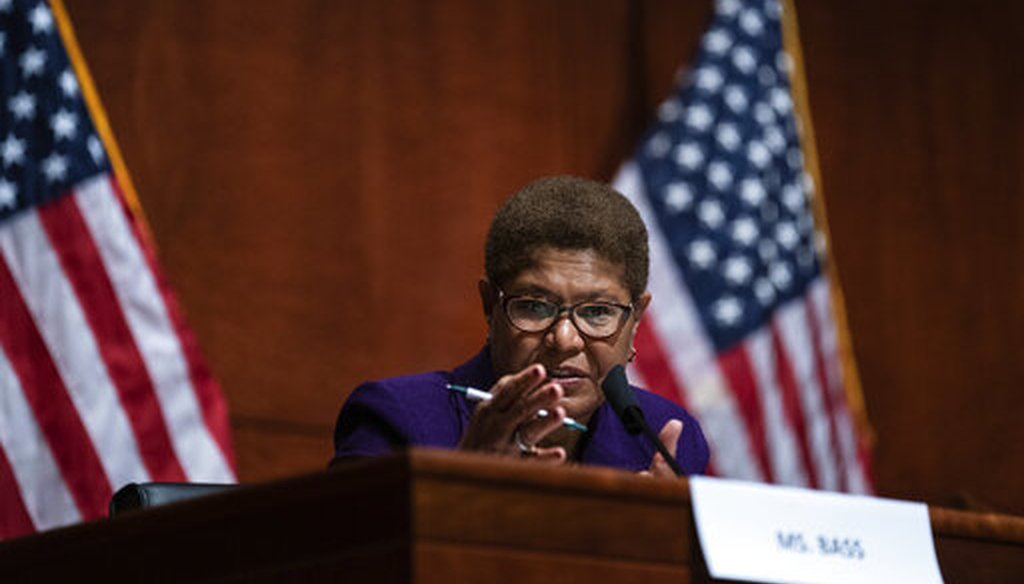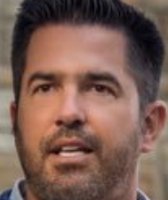Stand up for the facts!
Our only agenda is to publish the truth so you can be an informed participant in democracy.
We need your help.
I would like to contribute

Rep. Karen Bass, D-Calif., speaks during a House Judiciary Committee hearing on proposed changes to police practices and accountability on Capitol Hill, Wednesday, June 10, 2020, in Washington. (AP)
If Your Time is short
-
As a California congresswoman, Bass traveled to Cuba with the Obama administration in support of its policies.
-
At 19, Bass took her first trip to Cuba to help build homes. She returned to Cuba several times in the 1970s.
-
Bass called Fidel Castro “Comandante en Jefe” when he died. The phrase was used by Castro and seen as praise for him. Bass said recently she “wouldn’t do that again.”
U.S. Rep. Karen Bass, D-Calif., has had a lower profile than other Democrats, but now is a contender to be Joe Biden’s vice presidential running mate. That higher profile is coming with more scrutiny of her past positions, including her positions on Cuba.
U.S. Sen. Marco Rubio, R-Fla., said if Bass becomes vice president she "will be the highest-ranking Castro sympathizer in the history of the United States government." Democrats who represent large exile communities in south Florida have raised concerns, too.
Bass rejected Rubio’s characterization and called the Castro regime "brutal."
"Well, one, I don't consider myself a Castro sympathizer," she said on Meet the Press recently. "Number two, my position on Cuba is really no different than the position of the Obama administration."
Bass’ record on Cuba has raised questions about whether it will torpedo her chances to help Biden in Florida, a state with exiles who fled repressive regimes, including Cuba and Venezuela. In 2018, Florida Republicans attacked Democrats repeatedly as socialists and ultimately won those races by tiny margins.
Her critics point to three things about Bass and Cuba: her visits to the island as a young person in the 1970s, her comments on Fidel Castro’s death in 2016, and her overall policy positions on Cuba.
We found that Bass supported former President Barack Obama’s re-engagement policy on Cuba. She has walked back her comments on Castro’s death, and she has said that her early visits there need context.
Bass won her election for the California state assembly in 2004. She visited Cuba while in the state assembly and a few times after joining Congress in 2011. She traveled with the Center for Democracy in the Americas in 2011 to visit American political prisoner Alan Gross and with MEDICC to look at diabetes medication, her office said.
In a TV interview in August 2015, Bass, who had worked in the past as a physician assistant, spoke about her desire to test medications from Cuba used to help diabetics and about business opportunities in Cuba.
"Why wouldn’t we have a relationship with an island 90 miles off our coast with a population about the size of L.A. County -- not exactly a threat?" she said.
During Obama’s second term, Obama called for normalizing relations and making it easier for Americans to travel there. Biden has said that he would return to Obama’s Cuba policy.
"In large part, I would go back," Biden told CBS4’s Jim DeFede. "I’d still insist they keep the commitments they said they would make when we, in fact, set the policy in place."
Bass repeatedly praised Obama’s policies to re-engage with Cuba. In 2014, she said she hoped it would lead to a "free flow of ideas and trade, including a new avenue for agricultural businesses in California" and provide opportunities to "test and share medical breakthroughs."
Bass traveled with Secretary of State John Kerry to Havana in 2015 when the American flag was raised at the U.S. embassy.
She also traveled with Obama in March 2016 on his visit to Cuba when Obama met with Raul Castro and spoke to the Cuban people. During that visit, Bass tweeted a photo of herself from her 1973 visit to Cuba.
"#ThrowbackThursday to my first visit to #Cuba in 1973. Never imagined I would one day return with @POTUS!"
RELATED: Trump has largely kept promise to reverse Obama’s Cuba policy
Bass first visited Cuba in 1973 when she was 19 years old. The Atlantic magazine reported that she traveled as part of the Venceremos Brigade, a program jointly organized by the Castro government and the Students for a Democratic Society, a U.S. group. The Brigade organized trips for left-leaning Americans to Cuba.
"We built houses during the day," Bass said, "and then we had what they called cultural activities and we called parties. There was great music, rum, dancing. And we toured the country." She said she went to hear Castro speak and found him "charismatic," although she couldn’t understand what he said.
Bass, who is now chairwoman of the Congressional Black Caucus, told The Atlantic that she saw a connection between Black Cubans and Black Americans, but knew that Cubans didn’t have the same freedom to protest.
"I didn’t have any illusions that the people in Cuba had the same freedoms I did. I came home and was protesting everything; I knew that the Cuban people didn’t have the ability to do that," she told The Atlantic.
Bass was in Cuba eight times in the 1970s and saw Castro speak multiple times.
There have been allegations that Cuban intelligence was connected to the Brigade and that the Cuban military gave weapons training to the group. But Bass told The Atlantic that she was never involved in anything like that and never used a gun there. She was taught how to use a gun for target practice during a Brigade campaign trip in California and later learned the person was an undercover police officer.
Fidel Castro stepped down in 2008 and handed over power to his brother Raul. When Fidel Castro died in November 2016, Bass released a statement:
"As Cuba begins nine days of mourning, I wish to express my condolences to the Cuban people and the family of Fidel Castro. The passing of the Comandante en Jefe is a great loss to the people of Cuba. I hope together, our two nations will continue on the new path of support and collaboration with one another, and continue in the new direction of diplomacy."
The phrase "Comandante en Jefe" translates to commander in chief. The phrase was used by Castro to refer to himself in an effort to give him legitimacy, and it was used by the Cuban government. Using the title can be considered the equivalent of calling a dictator by his chosen title, said Sebastián A. Arcos, associate director of the Cuban Research Institute at Florida International University.
Using that title would anger and offend exiles, said Fernand Amandi, a Democratic pollster in Miami.
"For the Cuban exile community it is akin to giving Hitler the deference of ‘Fuhrer’ to an audience of Holocaust survivors," Amandi said. "The title was never ordained by the Cuban people; it was self-appointed by Castro himself without validation by any type of popular election."
Bass told The Atlantic and MSNBC’s Chuck Todd on Meet the Press and Chris Wallace on Fox News that she used the wrong words.
"I was expressing condolences to the Cuban people, to the people in Cuba, not Cubans around the world. I don't think that is a toxic expression in California," she said on Meet the Press. "But let me just say, Chuck, lesson learned. Wouldn't do that again. Talked immediately to my colleagues from Florida and realized that that was something that just shouldn't have been said."
But that explanation is still problematic, said Amandi.
"Why offer condolences to oppressed Cuban people after the demise of their oppressor, jailer torturer and, in many instances, murderer?"
Our Sources
Fox News, Trump campaign senior adviser Jason Miller on the state of the presidential race, mail-in voting, Aug. 2, 2020
Meet the Press, Transcript and video, Aug. 2, 2020
U.S. Rep. Karen Bass, Press releases about Cuba, 2015-2020
Politico, Karen Bass renounces her praise for Fidel Castro, Aug. 2, 2020
Politico, Karen Bass walks back Castro comment amid VP vetting, July 27, 2020
Politico, Florida Democrats recoil at Karen Bass VP float, June 27, 2020
The Atlantic, When Karen Bass Went to Work in Castro’s Cuba, July 31, 2020
McClatchy, Cuban-American Republicans attack potential Biden VP pick Karen Bass over Cuba ties, Aug. 1, 2020
KTLA, Rep. Bass joins KTLA Morning News to discuss U.S.-Cuba relations, Aug. 4, 2015
Washington Post, Cuba congressional delegation: Who traveled with John Kerry to Havana, Aug. 15, 2015
U.S. Rep. Karen Bass congressional office, Statement to PolitiFact, Aug. 3, 2020
U.S. Rep. Karen Bass, Tweet, March 24, 2016
President Donald Trump campaign, Joe Biden and Karen Bass would invite Castro’s communism into America, Aug. 1, 2020
Obama White House, Remarks by President Obama to the People of Cuba, March 22, 2016
President Barack Obama, Statement by the President on the Passing of Fidel Castro, Nov. 26, 2016
Email interview, Dario Moreno, associate professor in the Department of Politics & International Relations at Florida International University, Aug. 3, 2020
Telephone interview, Fernand Amandi, Democratic pollster in Miami, Aug. 3, 2020
Telephone text, State Sen. Annette Taddeo, Aug. 3, 2020
Email interview, Sebastián A. Arcos, associate director of the Cuban Research Institute at Florida International University, Aug. 4, 2020
































